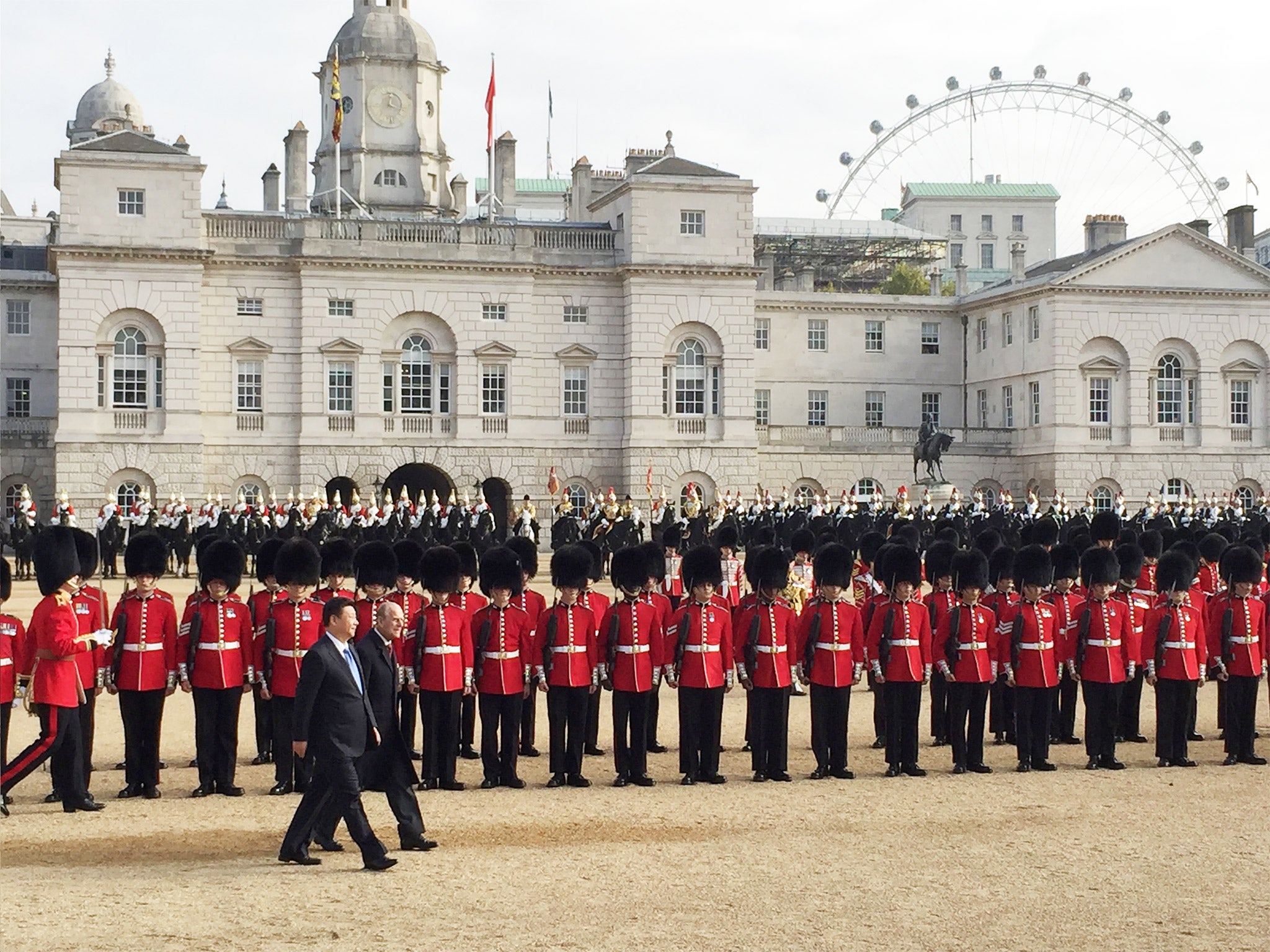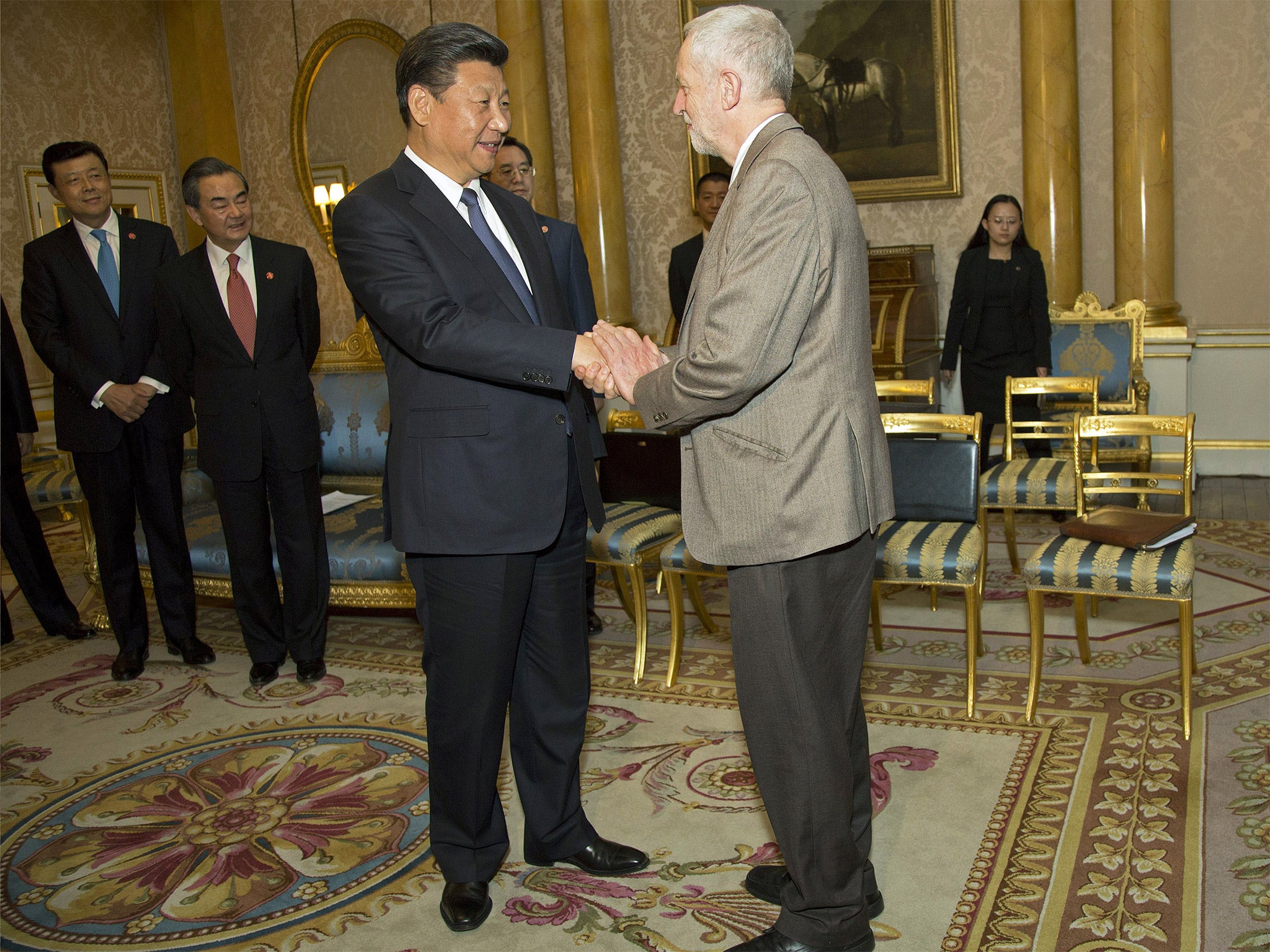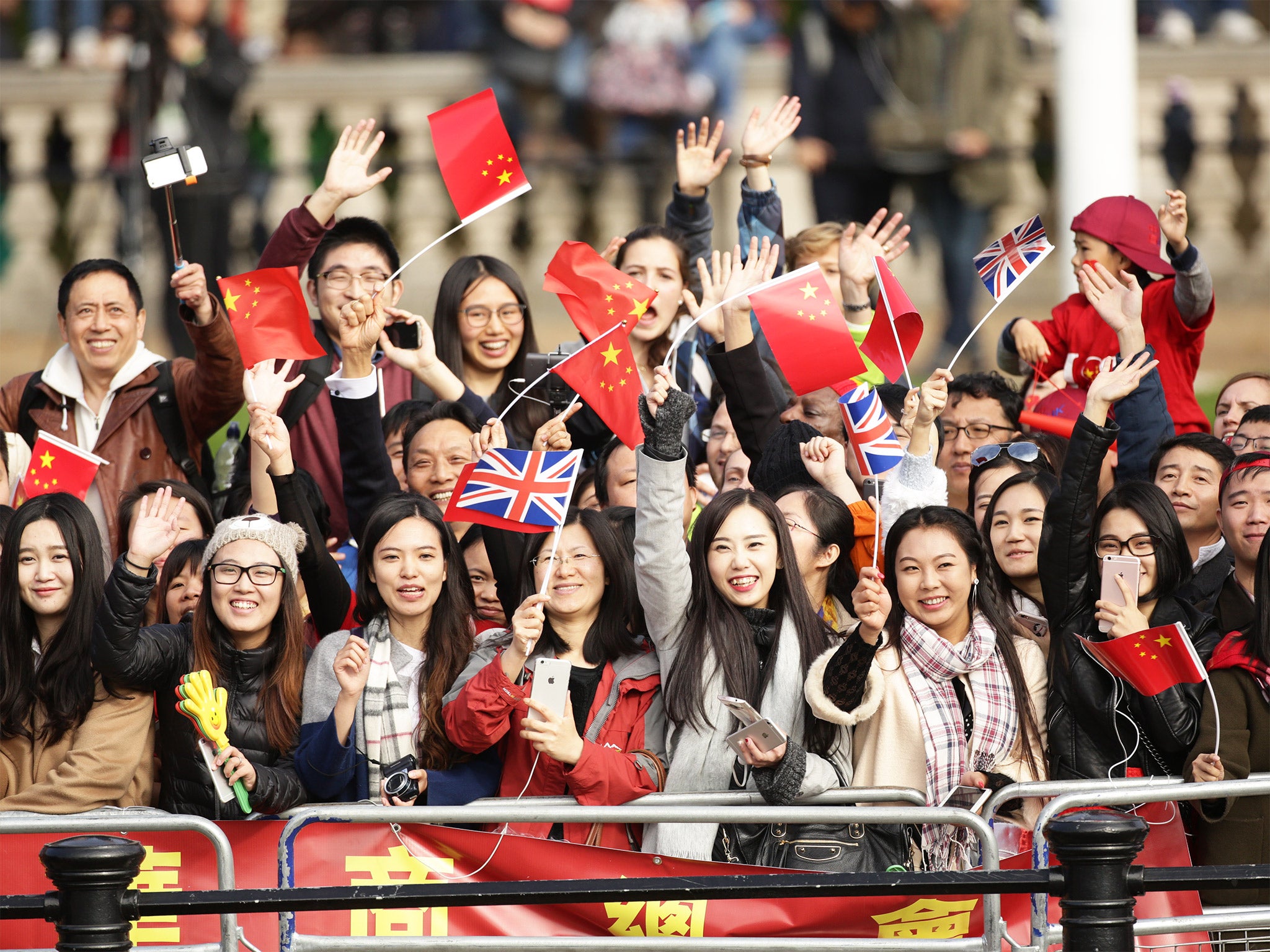China state visit: President Xi Jinping enjoys ceremony with no public mention of human rights
Andy McSmith watches Xi Jinping’s visit kick off – but did anyone dare to mention human rights off camera?

Your support helps us to tell the story
From reproductive rights to climate change to Big Tech, The Independent is on the ground when the story is developing. Whether it's investigating the financials of Elon Musk's pro-Trump PAC or producing our latest documentary, 'The A Word', which shines a light on the American women fighting for reproductive rights, we know how important it is to parse out the facts from the messaging.
At such a critical moment in US history, we need reporters on the ground. Your donation allows us to keep sending journalists to speak to both sides of the story.
The Independent is trusted by Americans across the entire political spectrum. And unlike many other quality news outlets, we choose not to lock Americans out of our reporting and analysis with paywalls. We believe quality journalism should be available to everyone, paid for by those who can afford it.
Your support makes all the difference.President Xi Jinping of China was treated to a faultless display of British pomp and ceremony on 20 October – and no one involved mentioned the words “human rights” – at least not in public.
The Speaker, John Bercow, veered close to the forbidden topic as he formally invited President Xi to address both Houses of Parliament in the Royal Gallery of the House of Lords – an honour “reserved only for those people we hold in the highest regard” – as the Lord Speaker, Baroness Frances d’Souza, flatteringly pointed out.
Protesters who wanted to make a point about the absence of political freedom in China or the occupation of Tibet had hoped to line the Mall as the ornate horse-drawn carriages took the royal party and their VIP guests from their formal welcoming ceremony to Buckingham Palace, but were told by police to stand back. Meanwhile, thousands were allowed to line up to cheer the Chinese President’s arrival, equipped with flags, T-shirts and hats, reportedly distributed by the Chinese embassy.
Chinese drums drowned out the shouts of the much smaller number of demonstrators from the Free Tibet group and scuffles broke out as the protesters broke through their perimeter fences. Police intervened to calm the crowd, but no arrests were made.

Jeremy Corbyn, who had threatened to raise the forbidden topic during the state banquet in the evening was instead allowed a face to face meeting with President Xi in the Bow Room in Buckingham Palace before the guests assembled for dinner. The Labour leader praised China’s extraordinary economic progress. A statement issued from his office added: “Jeremy also raised the issues of human rights and the impact of Chinese imports on the UK steel industry. It was agreed there should be further discussion of co-operation on climate change and cultural exchanges.”
The Prince of Wales, who is a friend of the exiled Dalai Lama, also had a 15-minute face to face meeting at Clarence House earlier in the day. He and the Duchess of Cornwall showed President Xi and his wife, Peng Liyuan, around an art exhibition at the Prince’s School of Traditional Arts, but did not attend the evening banquet.
As the Queen proposed a toast at the banquet, she mentioned her own and Prince Philip’s and Prince William’s visits to China, but no mention at all of the heir to the throne.
Welcoming President Xi to the Houses of Parliament in the afternoon, Mr Bercow remarked pointedly: “It is a reflection of our changing times that we have hosted no fewer than four prominent daughters and sons of Asia in our Parliament in the past three years, starting with Daw Aung San Suu Kyi of Burma, the Nobel Peace Prize winner, democracy champion and international symbol of the innate human right of freedom.” He also quoted a Chinese proverb that “it is better to light a candle than to curse the darkness”.
Kate Allen, director of Amnesty International, said later: “It’s welcome that the Speaker of the House of Commons made reference to international law, individual liberty and morality when he welcomed President Xi Jinping.
“Mr Bercow also mentioned the Nobel Peace Prize, a timely reminder that Chinese Nobel laureate Liu Xiaobo is still languishing in jail, serving an 11-year sentence simply for peacefully writing about proposed democratic reforms.”
But for the Government, the day was not about civil rights but about trade, particularly the £30bn of deals due to be signed during business meetings on 21 October, including a £3.2bn Chinese investment in the planned Paramount theme park in Ebbsfleet, Kent.
By cruel coincidence, the first full day of President Xi’s visit began with the announcement of 1,200 job losses at Tata Steel. John Park, from the trade union Community, which represents steel workers, said: “The dumping of cheap Chinese steel is a reality that is crippling the industry.”
But when addressing Parliament, the Chinese President chose to emphasise all the good points in Britain’s 200-year relationship with his country, ignoring such negatives as the opium wars in the 19th century. “Although my visit has just started, I am already deeply impressed by the vitality of China-UK relations and the profound friendship between our people. This gives me good reason to believe that my visit will lift the friendly ties between our two countries to a new height,” he said.
During the state banquet, the President was at the Queen’s right hand, with the Duchess of Cambridge to his right. Mr Corbyn was seated halfway down a side table, next to the Lady Mayoress of the City of London, Gilly Yarrow, and across the table from Mark Carney, the Governor of the Bank of England.

In her speech at the banquet the Queen told praised China’s rapid economic growth as a “huge and historic achievement” in lifting hundreds of millions of people out of poverty. Mr Xi said in response: “China and Britain respectively represent the great Oriental and Western civilisations. Though far apart geographically, our two countries have long engaged in close interactions.
“As an old Chinese adage goes, Opportunity may knock just once; grab it before it slips away. In Britain, you also have a famous saying, A wise man turns chance into good fortune. Let us seize the opportunity, and work together to usher in an even brighter future for China-UK relationship.”
Mr Corbyn, despite suggestions he might defy the formal dress code, wore white tie and tails for the banquet. During the address to Parliament, he stuck out because he was wearing a fawn jacket, while David Cameron, who was sitting alongside him, and all the other men within camera shot were in dark suits. The Labour leader was dressed in the same fawn jacket for his 6pm meeting with President Xi.
Other politicians at the state dinner came with their wives. Samantha Cameron was at a side table on the far side of the vast room from Mr Corbyn – but the Labour leader went on his own. Another complication was that the menu of turbot and venison did not appear to include a vegetarian option. The Labour leader presumably had to content himself with a side order of red cabbage and cocotte potatoes.
Q&A: Steel dumping explained
Q | What is steel ‘dumping’?
A | It is a technical term applied in international trade disputes. It’s where a country sells a product abroad at a price that does not reflect its true domestic cost. It is regarded as unfair competition and prohibited under free trade agreements.
Q | Is China guilty of it?
A | Here’s what we know. China’s domestic steel capacity has shot up dramatically over the past 15 years. It now accounts for half of the global total. And capacity continued growing in 2014 even though the growth of its domestic economy was slowing down. Chinese steel exports have gone up – they rose 40 per cent year in the first quarter of 2015. And Chinese steel imports to the UK have grown, from 2 per cent of the total four years ago to 8 per cent this year. It’s very likely that China is producing steel at below economic cost thanks to the soft bank loans given to state steel companies by state-owned banks. There is certainly a prima facie argument that China is indeed dumping steel on international markets.
Q | Why is China doing it?
A | Steel was one of the key drivers of China’s economic development since 1980. But things have gotten out of hand. There is now excessive capacity – possibly as high as 30 per cent. The Beijing government has said it plans to reduce some of the country’s excess capacity but it is proving difficult because steel is a large employer. Closing plants down would cost jobs, which would create a headache for local politicians at a time when the wider economy is stuttering. There are powerful domestic financial vested interests in the sector which who are fighting consolidation of their plants. The path of least resistance for officials and the industry itself is to soft-pedal reform and keep revenues up by dumping spare capacity abroad.
Q | What can the West do about it?
A | Since 2001 China has been a member of the World Trade Organisation. That means it must abide by the WTO rules that preclude dumping. The UK could take its case to the WTO dispute board in the hope of getting the right to impose duties on Chinese steel imports. This would require an analysis of whether dumping is occurring and a causal link between the two.
Another body which could be called upon to take more action is the European Commission, which already imposed some duties on steel from China in April.
Ben Chu
Join our commenting forum
Join thought-provoking conversations, follow other Independent readers and see their replies
Comments